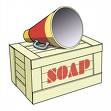
You Get Exposure and Build “Platform”
Many writers enjoy spending time alone in their “lonely garret” with only the company of a hot cup of coffee or tea and a computer (or a pad of paper and pencil). In fact, that’s what most writer’s like best.
To become a published nonfiction author, however, you must come out of the garret and socialize. You must talk with people and engage them in your work. You must get involved and interact with others. If you don’t do this, you won’t develop an audience for your work. You won’t build a base of readers—a “platform”—for your books.
If ”platform” represents new terminology to you, it’s time to become familiar with this word…very familiar, very fast.
A platform consists of:
- expert status
- numerous appearances on radio and Internet talk shows and television talk and news shows
- frequent quest blogs
- a well-known presence in on-line forums and social networks
- large numbers of followers on social networking sites
- popular videos, podcasts or blogs
- frequent interviews on other peoples’ podcasts
- your own Internet, radio or television show
- a multitude of published articles or books in both print and Internet publications
- an extremely large mailing list
- frequent talks and presentations given to small, medium and large groups
Most of the items on this list have little to do with writing. That’s what makes blogging such a great platform building option; it involves writing—and writing a lot. Traditionally the best way to build a platform involved going and out and speaking to audiences, but today you can speak to audience online via a blog. In fact, you can speak to a lot more people every day through a popular blog than you ever could via public speaking.
Imagine 1,000 or more people reading your blog every day. That’s a pretty awesome thought. That adds up to a lot of readers per month…enough to impress an agent or a publisher. If even two percent of those readers purchased a book you authored, that would be 20 books per day. That’s 140 books per week, or over 7,000 books in one year. A publisher would be thrilled with those sales numbers. According to BookScan, the average U.S. book is now selling less than 250 copies per year and less than 3,000 copies over its lifetime.
With that in mind, the other platform elements listed above have their place and are important if you want to become a traditionally published author. They also prove helpful if you want to sell a lot of self-published books. In fact, the larger your platform—in other words, the larger you fan base—the more people likely will purchase your book. These platform-building elements also are handy for driving traffic to your blog, and more traffic usually equates to more readers.
A successful blog can serve as the foundation of your platform. You may need little else. If you write a great blog and manage to draw enough readers, this alone can attract the attention of an agent or a publisher. It also can prove impressive enough as a platform element in a book proposal to land you a literary agent—with or without other elements.
These days every aspiring author (fiction and nonfiction) needs to have a blog. It’s a promotional necessity.
So, if you already must blog to promote yourself and your work—but your book isn’t yet written, why not blog your book into existence? You’ll be building platform as you complete your manuscript, and both your writing and your readers will act as beacons to agents and publishers.

[…] I realize that most of you blogging a book have the goal of building readership—author platform—for your book over time. Thus, blogging a book in a month may not work for you. So, I’ve got […]